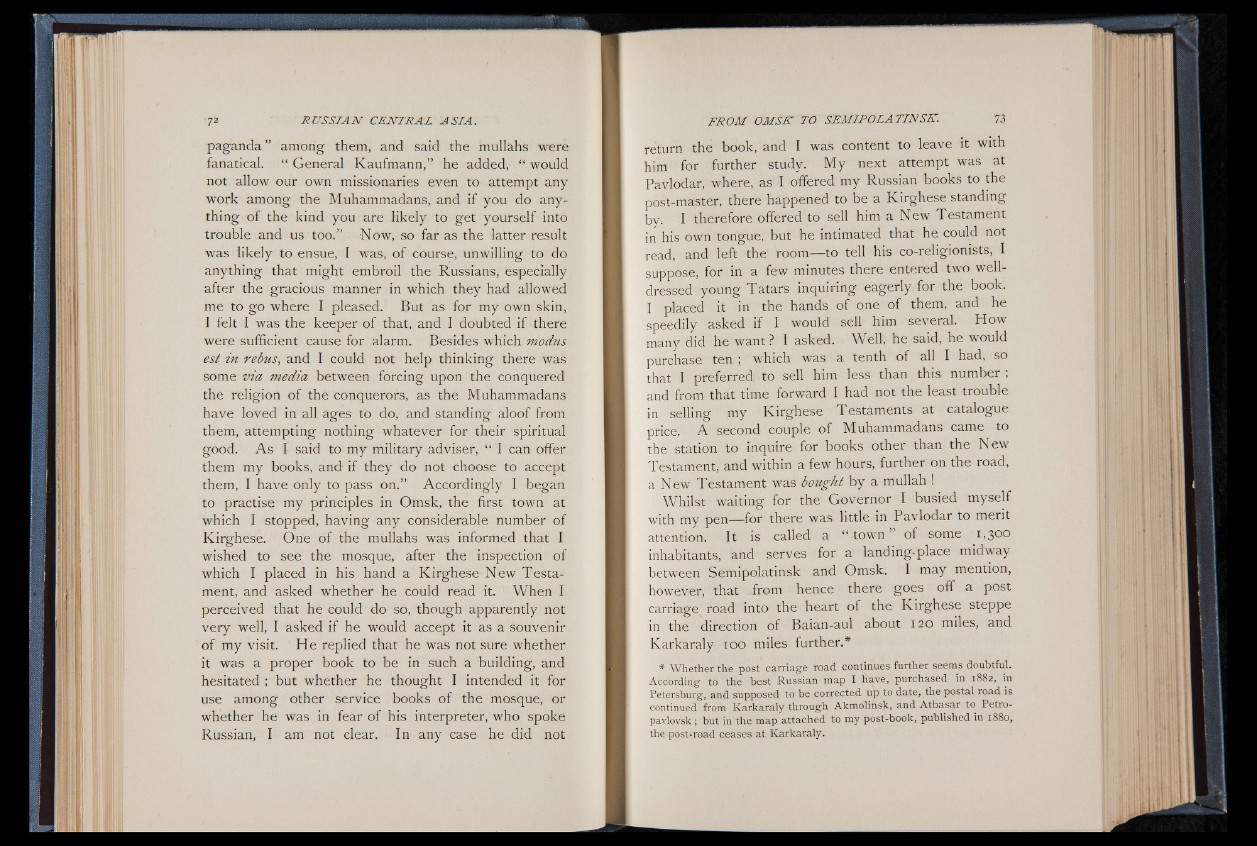
paganda” among them, and said the mullahs were
fanatical. “ General Kaufmann,” he added, “ would
not allow our own missionaries even to attempt any
work among the Muhammadans, and if you do anything
of the kind you are likely to get yourself into
trouble and us too.” Now, so far as the latter result
was likely to ensue, I was, of course, unwilling to do
anything that might embroil the Russians, especially
after the gracious manner in which they had allowed
me to go where I pleased. But as for my own skin,
I felt I was the keeper of that, and I doubted if there
were sufficient cause for alarm. Besides which modus
est in rebus, and I could not help thinking there was
some via media between forcing upon the conquered
the religion of the conquerors, as the Muhammadans
have loved in all ages to do, and standing aloof from
them, attempting nothing whatever for their spiritual
good. A s I said to my military adviser, “ I can offer
them my books, and if they do not choose to accept
them, I have only to pass on.” Accordingly I began
to practise my principles in Omsk, the first town at
which I stopped, having any considerable number of
Kirghese. One of the mullahs was informed that I
wished to see the mosque, after the inspection of
which I placed in his hand a Kirghese New Testament,
and asked whether he could read it. When I
perceived that he could do so, though apparently not
very well, I asked if he would accept it as a souvenir
o f my visit. He replied that he was not sure whether
it was a proper book to be in such a building, and
hesitated ; but whether he thought I intended it for
use among other service books of the mosque, or
whether he was in fear of his interpreter, who spoke
Russian, I am not clear. In any case he did not
return the book, and I was content to leave it with
him for further study. My next attempt was at
Pavlodar, where, as I offered my Russian books to the
post-master, there happened to be a Kirghese standing
by. I therefore offered to sell him a New Testament
in his own tongue, but he intimated that he could not
read, and left the room— to tell his co-religionists, I
suppose, for in a few minutes there entered two well-
dressed young Tatars inquiring eagerly for the book.
I placed it in the hands of one of them, and he
speedily asked if I would sell him several. How
many did he want? I asked. Well, he said, he would
purchase ten ; which was a tenth of all I had, so
that I preferred to sell him less than this number ,
and from that time forward I had not the least trouble
in selling my Kirghese Testaments at catalogue
price: A second couple of Muhammadans came to
the station to inquire for books other than the New
Testament, and within a few hours, further on the road,
a New Testament was bought by a mullah !
Whilst waiting for the Governor I busied myself
with my pen— for there was little in Pavlodar to merit
attention. It is called a “ tow n ” of some 1,300
inhabitants, and serves for a landing-place midway
between Semipolatinsk and Omsk. I may mention,
however, that from hence there goes off a post
carriage road into the heart of the Kirghese steppe
in the direction of Baian-aul about 120 miles, and
Karkaraly 100 miles further.*
* Whether the post carriage road continues further seems doubtful.
According to the best Russian map I H^ve, purchased in 1882, in
Petersburg,, and supposed to be corrected up to date, the postal road is
continued from Karkaraly through Akmolihsk, and Atbasar to Petro-
pavlovsk; but in the map attached to my post-book, published in 1880,
the post-road ceases at Karkaraly.